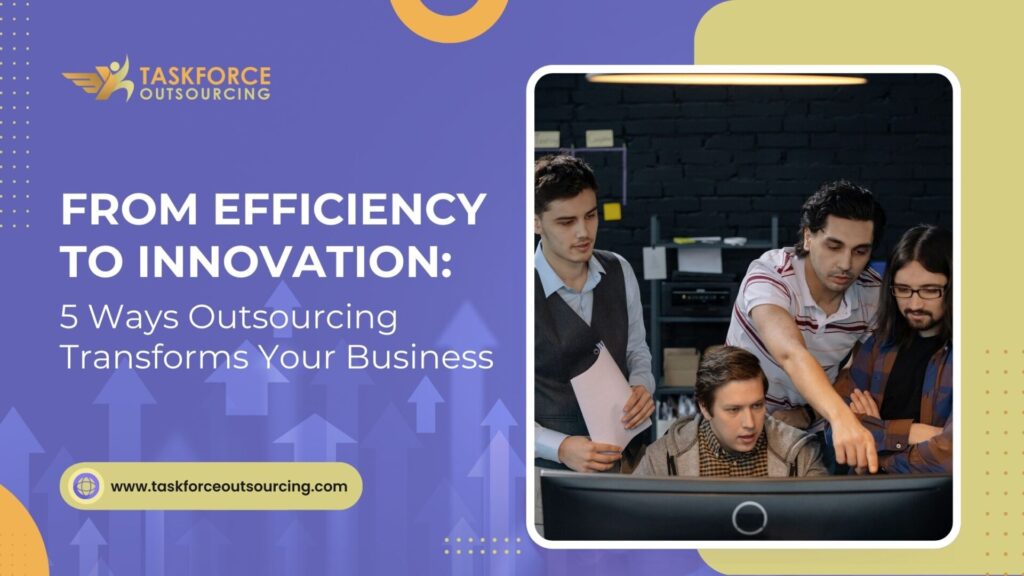In today’s dynamic business environment, staying competitive often requires organizations to rethink how they allocate resources and focus on their core strengths. Outsourcing has emerged as a powerful tool, not just for cost savings but for driving efficiency and unlocking new opportunities for innovation. In this blog, we explore five ways outsourcing can transform your business from a reactive organization to a proactive one poised for growth.
Contents
1. Streamlining Operations for Maximum Efficiency
At its core, outsourcing is often associated with cost reduction. By delegating non-core functions to specialized external partners, businesses can achieve significant operational efficiencies. Tasks such as payroll processing, IT support, and customer service can be performed more cost-effectively by experts, allowing internal teams to focus on strategic initiatives.
Key Benefits of Outsourcing for Efficiency:
- Reduced Costs: Lower labor and operational expenses by leveraging external expertise.
- Scalability: Adjust resources as your business needs fluctuate.
- Access to Expertise: Gain access to highly skilled professionals without the cost of full-time hires.
2. Accelerating Innovation Through External Expertise
While cost savings remain a key driver, the true potential of outsourcing lies in its ability to foster innovation. By freeing up internal resources and tapping into the expertise of external partners, organizations can explore new ideas, enter new markets, and implement cutting-edge technologies faster.
How Outsourcing Drives Innovation:
- Technology Adoption: Businesses can take advantage of the newest technology without having to make a sizable upfront investment by contracting with experts to handle IT functions.
- Creative Problem Solving: External teams bring fresh perspectives and innovative solutions to complex challenges.
- Focus on Core Strengths: Offloading non-core tasks allows your team to dedicate more time to developing new products, services, or strategies.
3. Building a Competitive Edge
Outsourcing helps businesses gain a competitive edge by providing access to global talent, faster execution, and specialized knowledge. This strategic approach allows companies to stay ahead of industry trends and focus on their unique value propositions.
4. Learning from Success Stories
Many companies have successfully leveraged outsourcing to drive transformation:
- Airbnb: Outsourced customer support to scale operations globally while maintaining high service standards.
- Slack: Relied on outsourced developers in its early stages to build the foundation of its platform.
- WhatsApp: Used external development teams to minimize costs and focus on its core offering, resulting in rapid growth and eventual acquisition by Facebook.
5. Ensuring Strategic Implementation
To maximize the benefits of outsourcing, it’s crucial to approach it strategically:
- Identify Core vs. Non-Core Activities: Focus on outsourcing tasks that don’t directly contribute to your competitive advantage.
- Choose the Right Partner: Select providers with proven expertise, strong track records, and cultural alignment.
- Maintain Oversight: Establish clear communication channels and performance metrics to ensure accountability and alignment with your goals.
- Foster Collaboration: Treat outsourcing partners as extensions of your team to drive better outcomes.
Conclusion: Unlocking Potential Through Outsourcing
Outsourcing is no longer just about cutting costs—it’s a strategic enabler that drives efficiency, scalability, and innovation. By thoughtfully integrating outsourcing into your business model, you can position your organization for sustainable growth and success in an increasingly competitive landscape
Frequently Asked Questions (FAQs)
A: Tasks that are not part of your company’s core competencies, such as payroll, IT support, customer service, and administrative functions, are ideal for outsourcing. These allow your internal team to focus on strategic and revenue-generating activities and will also help with the company's efficiency and innovation.
A: Outsourcing provides access to specialized expertise and advanced technologies. It frees up internal resources, enabling your team to focus on creative problem-solving, new product development, and market expansion.
A: Common risks include lack of control, communication issues, and misalignment with business goals. To mitigate these, select experienced outsourcing partners, set clear expectations, and maintain regular communication.
A: Evaluate potential partners based on their expertise, track record, cultural compatibility, and scalability. Request references and pilot projects to ensure alignment with your business needs.
A: No, businesses of all sizes can benefit from outsourcing. Small and medium-sized enterprises (SMEs) often use outsourcing to access resources and expertise they might not have in-house, enabling them to compete with larger organizations.


